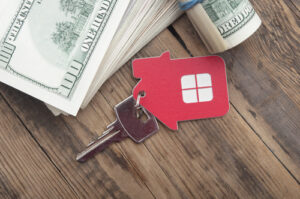Which is Better: Buy with Cash or Hard Money Loan?
There are plenty of ways to finance real estate, whether with a traditional mortgage loan, hard money loan, or cash. However, with competition in the housing market, paying with cash generally sets you apart from other bidders. Additionally, there’s not always time to apply and wait for traditional financing. As such, many investors find themselves either buying with cash or hard money. In this article, we’ll discuss how they differ and the pros and cons of each method.

Contents of This Article:
- Should You Buy With Cash or Hard Money?
- Pros and Cons of Hard Money vs. Cash
- Factors That May Impact Which Option You Choose
- Find a Reputable Lender Near You
Should You Buy With Cash or Hard Money?
There are several financing options to consider if you’re looking at buying real estate. For instance, you could use a traditional mortgage loan, pay with all cash, or find a creative way to fund your investment. Surprisingly, many confuse hard money loans and cash offers–are they the same?

No, there are several distinct differences between using hard money and cash to buy an investment property. After all, a cash offer implies that you already have the money in your possession. However, if you use a hard money loan to buy a property, you’re borrowing funds because you don’t have the cash or don’t want to use it.
That said, there are plenty of similarities between using cash and a hard money loan to buy an investment property. For instance, both options allow you to obtain a property quickly–much quicker than applying for a traditional mortgage loan. Hard money loans can be funded within just a few days, while mortgage loans generally take several weeks.
If you’re wondering whether you should buy with cash or hard money, consider talking with a lender to learn their terms and conditions. If you need help finding a lender, it’s as easy as searching: a hard money lender near me. But next, we’ll review the pros and cons of hard money vs. cash payments for an investment.
Pros and Cons of Hard Money vs. Cash
It’s hard to say that any investment method is perfect–they all have their benefits and disadvantages. For example, while it may seem easier and most straightforward to buy a property with cash, there’s still a lot to consider. On the other hand, hard money loans offer several conveniences if you don’t have cash on hand. However, they come with higher interest rates and short repayment terms. Either way, let’s review each method’s pros and cons.
Pros of Buying With Cash
- No Interest Payment- If you’re buying a property with cash, you don’t have to worry about paying interest on a mortgage loan.
- Immediate Cash Flow- When you own rental properties, achieving positive cash flow isn’t easy. However, when you pay for your investment in cash, you can start earning positive cash flow immediately without putting any of it toward a mortgage payment.
- 100% Equity- Buying real estate outright means you own 100% of the home’s value in equity. So, instead of paying off a mortgage, you can focus on increasing the property’s value through upgrades or renovations.

Cons of Buying With Cash
- Reduced Buying Power- Financing multiple rentals can benefit investors. For instance, cash flow increases with several monthly rent payments from multiple tenants.
- No Leverage Power- Leveraging means using other people’s money for your investment property. While there’s a risk to financing real estate, investors can free up their own funds to purchase additional business needs. That way, you can earn high returns while making other people’s money work for you.
- Fewer Tax Benefits- Sometimes, having a mortgage can be more beneficial than purchasing a property with cash. For instance, any money you pay in interest toward a rental property can be deducted from your taxes. You miss some tax benefits if you pay for a property in cash.
Pros of Hard Money Loans
- Faster Approval- When you apply for a hard money loan, it’s generally approved within just a few days, much quicker than a traditional mortgage loan. As a result, you can start your investment almost as quickly as if you’d paid for it with cash.
- More Flexible Terms and Loan Options- Hard money loans have less strict requirements and more flexible loan terms. For instance, instead of looking at your credit history to determine a loan amount, they’ll look at the value of your investment.
- Fix-and-Flip Opportunities- Hard money loans present a number of opportunities. For instance, they’re great for fix-and-flip projects, allowing you to repay the loan on time and make a return on your investment.

Cons of Hard Money Loans
- Higher Interest Rates and Down Payment- While it depends on your hard money lender, most have higher interest rates and larger down payments. For instance, they’ll generally require a down payment of at least 20% to 30%.
- Short Repayment Terms- You must repay your hard money loan within a certain time. Generally, you have 1 to 3 years to repay the loan, which is significantly less time than you’d have with a traditional mortgage.
- Risk of Losing Your Investment- Since your property is used as collateral for a hard money loan, you risk losing your investment if you fail to repay it. A hard money lender can seize the property if you cannot repay the loan.
Factors That May Impact Which Option You Choose
A few factors may influence your decision if you’re trying to decide whether to buy with cash or hard money. For instance, you may choose one or the other depending on your investment goals, what type of property you buy, and your budget. Let’s explore some of these points further.

One factor that may influence your financing method is your readiness and investment goals. For example, if you’re looking to fix and flip a property for short-term profit, it could be beneficial to use a hard money loan to use your personal cash for renovations. Then, you can pay the loan with the money you make from the flip. On the other hand, if you’re looking for long-term cash flow, you may explore a buy-and-hold property that you could buy outright and start earning immediately.
Another factor that may influence how you finance an investment property is your budget and financial status. Paying in cash could be great if you have enough money to buy a property outright. However, it leaves you stretched for potential repairs or emergency costs. In that case, you may want to explore a hard money loan to fund the property, then use your cash for repairs or investing in other properties.
Find a Reputable Lender Near You
If you have the money, deciding whether to buy with cash or hard money can be difficult. There are several pros and cons for each method to consider, and ultimately, it’s up to you and your investment goals. However, if you’re looking for a reputable hard money lender to help you secure an investment property, look no further than Maryland Hard Money Lenders.
Our team of professional lenders works with all types of investors. So, whether you’re funding a fix-and-flip property or a new construction project, we can help you get a loan. Contact Maryland Hard Money Lenders today to learn more about our loans and fill out an application to get funded as soon as possible.



